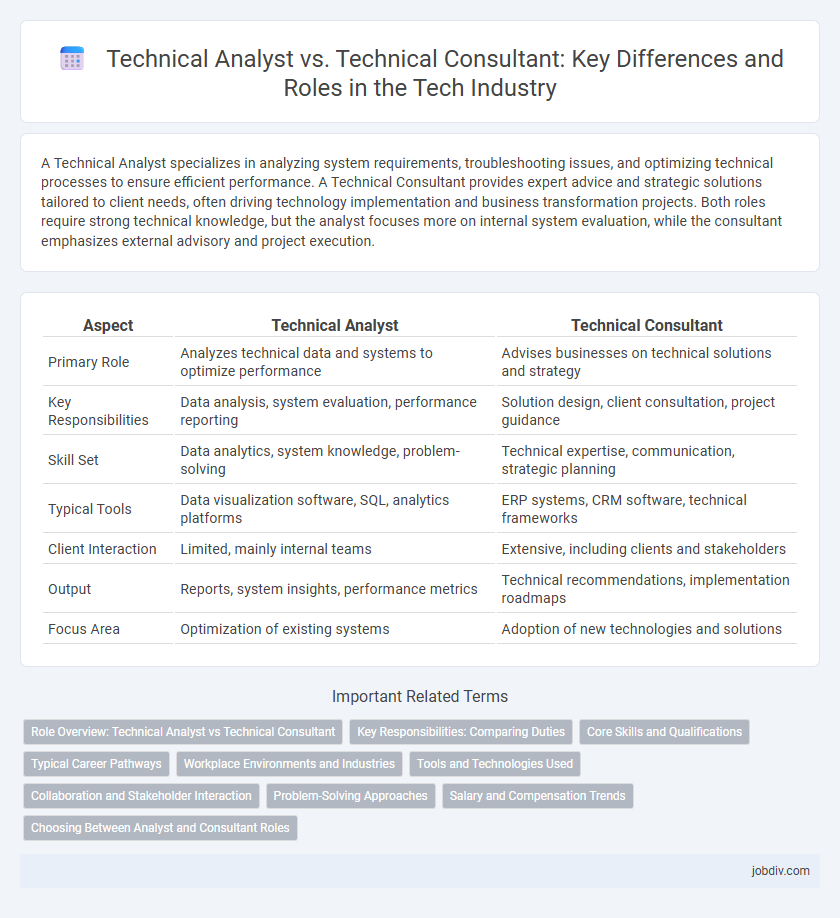A Technical Analyst specializes in analyzing system requirements, troubleshooting issues, and optimizing technical processes to ensure efficient performance. A Technical Consultant provides expert advice and strategic solutions tailored to client needs, often driving technology implementation and business transformation projects. Both roles require strong technical knowledge, but the analyst focuses more on internal system evaluation, while the consultant emphasizes external advisory and project execution.
Table of Comparison
| Aspect | Technical Analyst | Technical Consultant |
|---|---|---|
| Primary Role | Analyzes technical data and systems to optimize performance | Advises businesses on technical solutions and strategy |
| Key Responsibilities | Data analysis, system evaluation, performance reporting | Solution design, client consultation, project guidance |
| Skill Set | Data analytics, system knowledge, problem-solving | Technical expertise, communication, strategic planning |
| Typical Tools | Data visualization software, SQL, analytics platforms | ERP systems, CRM software, technical frameworks |
| Client Interaction | Limited, mainly internal teams | Extensive, including clients and stakeholders |
| Output | Reports, system insights, performance metrics | Technical recommendations, implementation roadmaps |
| Focus Area | Optimization of existing systems | Adoption of new technologies and solutions |
Role Overview: Technical Analyst vs Technical Consultant
A Technical Analyst specializes in evaluating and optimizing existing systems through detailed data analysis to identify issues and recommend improvements. A Technical Consultant provides expert advice and strategic guidance on implementing new technologies and solutions tailored to business needs. Both roles require strong technical expertise, but the Analyst focuses more on internal system insights, while the Consultant emphasizes client-facing solution design and deployment.
Key Responsibilities: Comparing Duties
Technical Analysts primarily focus on evaluating system requirements, identifying technical issues, and validating solutions to ensure alignment with business goals. Technical Consultants typically provide expert advice on technology implementation, customize solutions for clients, and support strategic decision-making processes. Key responsibilities differ as Analysts emphasize problem identification and requirement analysis while Consultants drive technology adoption and optimization.
Core Skills and Qualifications
Technical Analysts excel in data interpretation, system diagnostics, and performance evaluation, requiring strong analytical skills, proficiency in programming languages like Python or SQL, and expertise in software testing methodologies. Technical Consultants combine technical expertise with client-facing skills, emphasizing problem-solving, communication, and project management, often holding certifications such as PMP or ITIL and demonstrating knowledge in system integration and enterprise architecture. Both roles demand a solid foundation in IT infrastructure, but Technical Analysts focus more on internal data-driven insights while Technical Consultants prioritize tailored technical solutions and stakeholder collaboration.
Typical Career Pathways
Technical Analysts typically begin their careers in roles such as Junior Analyst or IT Support, progressing to Senior Analyst or Systems Analyst before moving into specialized positions or management. Technical Consultants often start as Technical Support Engineers or Junior Consultants, advancing to Senior Consultant roles and eventually to Solutions Architect or IT Advisory positions. While Technical Analysts focus more on data interpretation and system performance, Technical Consultants emphasize client-facing solutions and strategic implementation, influencing the trajectory of career advancement in each path.
Workplace Environments and Industries
Technical Analysts typically operate within corporate IT departments, financial institutions, and software development firms where they analyze system requirements and test software solutions. Technical Consultants often work across diverse industries such as healthcare, manufacturing, and telecommunications, providing expert advice on technology implementation and process optimization. The workplace for Technical Consultants tends to be more client-facing and project-based, while Technical Analysts are more embedded within organizational teams focusing on ongoing technical support and analysis.
Tools and Technologies Used
Technical Analysts primarily use data visualization software, spreadsheet tools like Excel, and requirements management applications to interpret and document system requirements. Technical Consultants rely on advanced technologies such as enterprise architecture frameworks, cloud platforms like AWS or Azure, and integration middleware to advise on and implement technical solutions. Both roles depend heavily on collaboration tools like Jira or Confluence to facilitate communication and project tracking.
Collaboration and Stakeholder Interaction
Technical Analysts collaborate closely with project managers and development teams to gather and analyze requirements, ensuring alignment between technical solutions and business needs. They engage stakeholders through detailed documentation and communication, facilitating informed decision-making and continuous feedback loops. Technical Consultants interact with diverse clients and executives, offering expert guidance and tailored strategies to optimize technology adoption and solve complex challenges.
Problem-Solving Approaches
Technical Analysts approach problem-solving by systematically analyzing system data, identifying patterns, and diagnosing issues based on empirical evidence. Technical Consultants leverage their broad industry experience to provide strategic solutions and recommend best practices tailored to organizational needs. Both roles prioritize resolving technical challenges but differ in scope, with analysts focusing on detailed root-cause analysis and consultants emphasizing holistic, solution-driven guidance.
Salary and Compensation Trends
Technical Analysts typically earn between $65,000 and $90,000 annually, with compensation influenced by industry and experience level, while Technical Consultants command higher salaries, ranging from $80,000 to $120,000 due to their advisory role and project management responsibilities. Salary growth for Technical Consultants tends to outpace that of Technical Analysts, reflecting increased demand for strategic technical guidance and client-facing expertise. Bonus structures and performance incentives are more prevalent in Technical Consultant roles, contributing significantly to total compensation packages.
Choosing Between Analyst and Consultant Roles
Choosing between a Technical Analyst and a Technical Consultant role depends on your expertise in data interpretation versus strategic implementation. Technical Analysts specialize in analyzing system requirements, troubleshooting, and optimizing workflows through detailed data assessment and reporting. Technical Consultants focus on advising organizations by designing solutions, managing project execution, and aligning technology strategies with business goals for maximum impact.
Technical Analyst vs Technical Consultant Infographic

 jobdiv.com
jobdiv.com